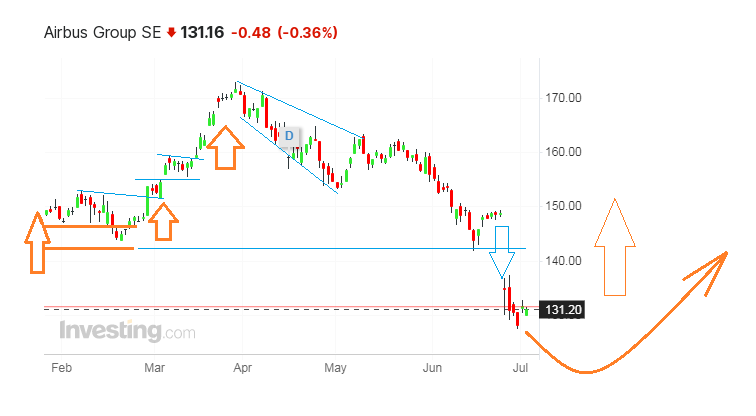Buying Well-Discounted Airbus Shares
In the last few months, I never touched upon the subject of Airbus shares. The largest European maker of commercial aircrafts set a new record high of €172.78 before the end of March, following a wave of massive purchases in response to continuing troubles of its main global rival Boeing. You may recall that, as I set my pen to a number of articles about the consequences of worsening the market's attitude to Boeing assets in favour of growing investments to Airbus. And, of course, I had also bought some stocks of Airbus for myself in the first decade of January, as soon as the incident with the lost door plug during Boeing's 737 MAX 9 flight from Portland to Oregon happened.
This kind of behaviour quickly paid off, as the whole story began at nearly €140 per share, so that it managed to add more than 20% before peaking. Later on, there was a moderate pullback in April and May, which ultimately resulted in the Airbus stock's surprising fall at a two-digit percentage pace after June 25 when the Airbus management cut its own financial projections for 2024. Airbus now expects underlying operating income of around €5.5 billion, instead of a previous estimate within a range between €6.5 billion to €7 billion, and free cash flow of €3.5 billion instead of €4 billion. The mentioned reasons were extra costs in its space systems division, combined with temporary supply chain issues, including part shortage.
While lowering its forecast for deliveries to around 770 jets from around 800, Airbus also took a hefty €900 million charge for its space activities and tempered previous plans to raise output of its best-selling A320neo family, by delaying the date of reaching a planned production speed of 75 jets a month to 2027 from 2026. Airbus produces an estimated 50 jets each month now. Of course, this was a significant adjustment in the company's forward guidance message. Yet, falling short at the end of deliveries is not the same thing as troubles with a lack of orders and demand, which Boeing faces.
If you cannot provide enough engines for your best-selling planes, you get less money flow, yet you are going to seize it over the horizon in the next couple of years. So, a kind of postponed shipment doesn't look like a critical problem for Airbus business. Meanwhile, its share price dropped to levels, which are even 6.5% below the area where I just first time and happily bought Airbus in January.
Therefore, one need not buy any well-discounted shares of its rival Airbus, only if feeling that the whole air shipping industry is going to die or emerging into a deep crisis like it was in the covid era. I buy Airbus here and now, just a bit above €131 per share, as I strongly believe that the lion's share of all aircraft orders will continue to go to Airbus, and not to Boeing, even if Airbus would be unable to keep up the pace of growing orders for a while. Even if Airbus would come to some lower levels like €115 or €120 before a great recovery, I can easily live with that and will survive.
As to Boeing, it is still not O.K. The latest news is that the US authorities are waiting for Boeing to accept "a plea deal to settle felony fraud charges related to two fatal crashes of its 737 Max planes", according to Associated Press, which would mean Boeing's potential agreement to independent monitoring for compliance with anti-fraud laws after the Justice Department said Boeing violated the terms of a 2021 agreement, which shielded it from prosecution over deadly crashes. And any bad news for Boeing is now good news for its main rival.

Disclaimer:
The comments, insights, and reviews posted in this section are solely the opinions and perspectives of authors and do not represent the views or endorsements of RHC Investments or its administrators, except if explicitly indicated. RHC Investments provides a platform for users to share their thoughts on financial market news, investing strategies, and related topics. However, we do not guarantee the accuracy, completeness, or reliability of any user-generated content.
Investment Risks and Advice:
Please be aware that all investment decisions involve risks, and the information shared on metadoro.com should not be considered as financial advice. Always conduct thorough research, seek professional advice, and exercise caution when making investment decisions.
Moderation and Monitoring:
While we strive to maintain a respectful and informative environment, we cannot endorse or verify the accuracy of all user-generated content. We reserve the right to moderate, edit, or remove any comments or posts that violate our community guidelines, infringe on intellectual property rights, or contain harmful content.
Content Ownership:
By submitting content to metadoro.com, users grant RHC Investments a non-exclusive, royalty-free license to use, display, and distribute the content. Users are responsible for ensuring they have the necessary rights to share the content they post.
Community Guidelines:
To maintain a positive and respectful community, users are expected to adhere to the community guidelines of Metadoro. Any content that is misleading, offensive, or violates applicable laws and regulations will be subject to moderation or removal.
Changes to Disclaimer:
We reserve the right to update, modify, or amend this disclaimer at any time. Users are encouraged to review this disclaimer periodically to stay informed about any changes.









